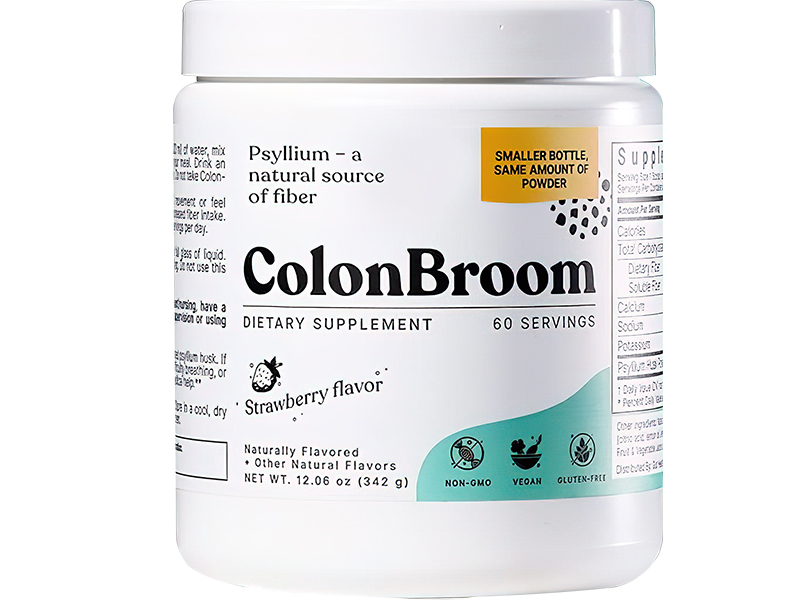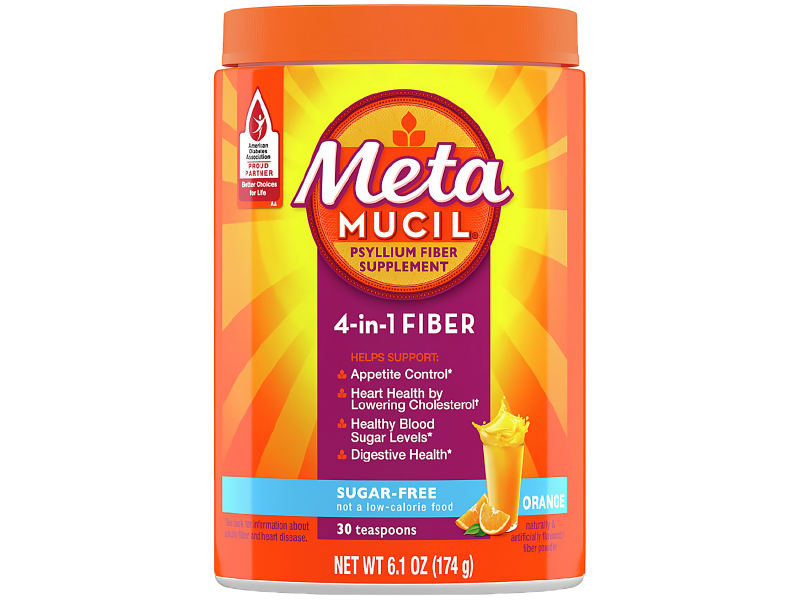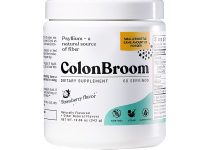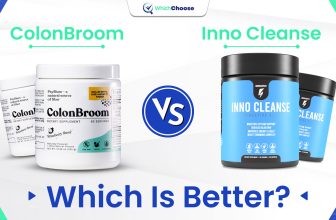Table of Contents
This post contains affiliate links. We earn an affiliate commission when you click our links to purchase products. It has no added cost to you.
ColonBroom and Metamucil are two of the most popular gut health products on the market. Both claim to help reduce appetite and aid in digestive health. Therefore, which one is the best choice for you? Scroll down the ColonBroom vs Metamucil comparison from WhichChoose to determine the right supplement.

ColonBroom Vs Metamucil: Overview
First, let’s take a look at an overview of ColonBroom and Metamucil
Relieve constipation and diarrhea.
Treat bloating.
100% gluten-free and vegan.
Crystallized lemon.
Sea salt.
Aid weight loss.
Assist digestive health.
Decrease cholesterol levels.
Reduce cravings.
Maltodextrin.
Aspartame and Yellow 6.
1.1. ColonBroom
ColonBroom is a fiber-rich dietary supplement that aids in improving gut health[1] and lowering diarrhea. The ingredients in it help promote regular bowel movements and remove toxins. The ColonBroom Program offers additional health benefits, such as bettering metabolic health, lowering blood sugar, aiding in weight loss, and increasing metabolic rates. Additionally, it is a gluten-free and vegan supplement with testimonials and positive reviews.
ColonBroom is gentle for consumers with allergic reactions. Moreover, it is a bulk-producing laxative that absorbs water in the colon, which assists in bettering gut health, tackling constipation, reducing bloating, and increasing probiotic activity.
1.2. Metamucil
Metamucil is one of the most recognized powder form fiber products on the market. This sugar-free product optimizes bowel movements and is renowned for clearing stored toxins and constipation. It also triggers weight drop and can be a perfect option for the digestive system if you love the flavors it incorporates.
ColonBroom Vs Metamucil: Ingredients
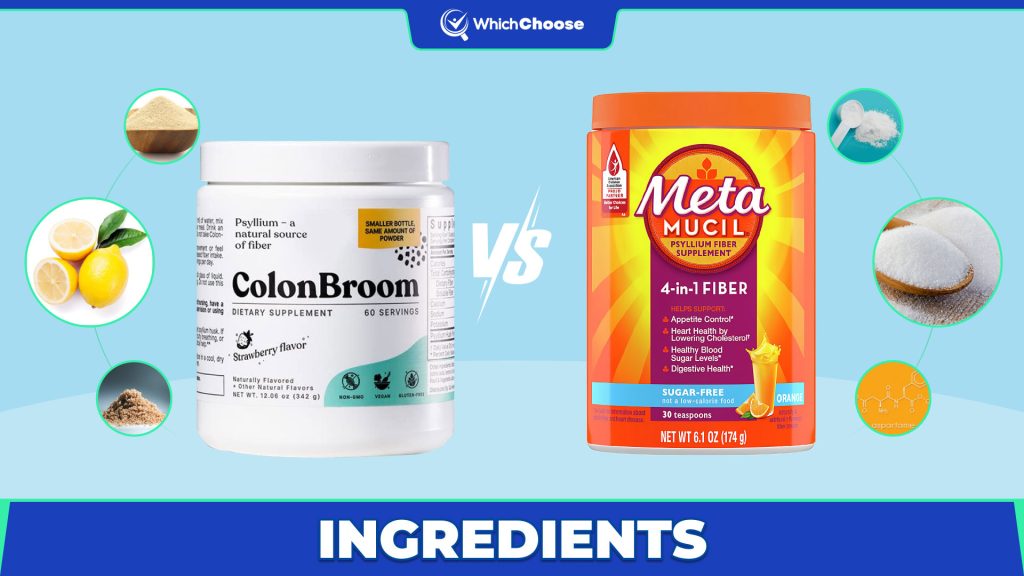
2.1. Common Ingredients
Both ColonBroom and Metamucil contain Psyllium husk powder. Psyllium is a fiber that absorbs water in the whole gut system and turns into a gel-like and thick substance that increases the softness or size of stools for a smooth bowel journey[2]. Moreover, it effectively defeats liquid diarrheal stools and bloating or painful flatulence.
2.2. Unique Ingredients
Next, we move on to the unique ingredients of ColonBroom and Metamucil.
Sea salt offers many health benefits[4]. It aids in keeping blood pressure normal. Additionally, it betters skin health and is beneficial for overall digestive health. It assists in cleansing the colon and acts as a laxative. It also helps detoxify the body and reduces constipation.
Stevia: Most supplements are filled with artificial sweeteners, which can have several negative side effects on health. On a good note, the ColonBroom supplement uses stevia to bring a naturally sweet taste[5]. Moreover, stevia can promote reducing blood sugar and cholesterol levels.
Maltodextrin[7] brings Metamucil viscosity and betters mouthfeel and texture. Yet, this ingredient can lead to blood glucose spikes and harm diabetics.
Sucralose[8]: Metamucil offers sugar-free selections to choose from. Yet, in some sweet versions, sucralose is the sweetener of selection for Metamucil.
As can be seen, ColonBroom’s ingredients bring more health benefits than Metamucil’s ingredients. Moreover, ColonBroom uses stevia as an alternative to artificial sweeteners, which makes you feel safe when using this product. In contrast, Metamucil contains some ingredients that have not been scientifically tested. Thus, you need to read Metamucil’s ingredients list carefully before purchasing it.
ColonBroom Vs Metamucil: Pros And Cons
Each product has it benefits and drawbacks; therefore, let’s compare pros and cons of ColonBroom vs Metamucil in the table below:
Lower sugar cravings and appetite.
Control bowel movements.
Improve skin.
Decrease blood sugar to reduce the risk of developing diabetes.
Accelerate weight drop.
Help the immune system.
Bloating may happen during the first few days.
This product does not cater to all allergies.
Help users feel more energetic.
Better bowel movement regularity.
Promote healthy bowel movements.
Have many selections to meet particular needs sweetened or unsweetened, etc.
It is not keto-friendly.
It has common side effects, like digestive problems and abdominal cramps.
To gain some of the health claims, users must take lots of product per day.
ColonBroom vs Metamucil: Taste
For Metamucil, you can mix its powder easily and rapidly. Following that, there is no grittiness or clunkiness in the mouth, and the aftertaste makes you feel like orange soda pop but is not too strong. In general, results from using this product will often be seen within 24 to 72 hours.
What about ColonBroom’s taste? In the ColonBroom container, there’s already a scoop that automatically measures the fiber dosage you need every day. You just stir the powder into 8oz of water, have the first sip and feel the delicious strawberry flavor in your mouth. ColonBroom may show effective outcomes within 2 to 3 weeks.
ColonBroom vs Metamucil: Side Effects

5.1. ColonBroom
As information on its official website, there are no severe risks linked to ColonBroom. However, some consumers have reported experiencing bloating after several days of using this supplement. If you suffer from this symptom, you need to talk to your doctor. Besides bloating, no experienced or reported severe side effects of using ColonBroom.
For better outcomes, you should use enough fluid when using ColonBroom. Taking enough fluids is essential to prevent constipation or acid reflux from the high fiber content in this supplement. Also, it is recommended to follow the additional steps in the ColonBroom Program for all the claimed benefits. Lactating women, pregnant women, and those looking to conceive should talk to doctors before taking ColonBroom.
5.2. Metamucil
For Metamucil, you may feel bloated or suffer stomach cramps. This product can lead to digestive issues when you use it without taking a glass of water. Because the drug is a laxative, it may lead to loose stool. If this symptom happens, you stop using it and stay hydrated.
ColonBroom vs Metamucil: The Price And Where To Buy
6.1. ColonBroom
One bottle of ColonBroom costs $69.99 and its price is quite expensive. Don’t worry! ColonBroom has offered 65% OFF for 3 & 6 months plan. Just grab a chance and enjoy your ColonBroom now. You can refer to some ColonBroom’s prices below:
- 1 Bottle: $69.99 + Free Delivery.
- 3 Bottles: $45.99 + Free Delivery.
- 6 Bottles: $35.99 + Free Delivery.
Upon purchase, every customer gets the entire ColonBroom Program – a free diet guide, workout plan, and an app to track their progress.
Vegan and 100% gluten-free.
Boost metabolism rate & assist in weight drop.
Promote a rise in energy levels.
6.2. Metamucil
The prices of Metamucil is quite affordable and you can purchase this product anywhere, such as Walmart, Amazon, Target, etc. Some Metamucil’s prices are listed below:
- 1 Bottle: $32.99 + Free Delivery.
- 2 Bottles: $56.82 + Free Delivery.
- 6 Bottles: $199.99 + Free Delivery.
Reduce cholesterol levels.
Better blood sugar control.
Help weight drop.
Minimize cravings.
In conclusion, choosing ColonBroom or Metamucil depends on your budget and needs. However, we believe Conlon Broom is a better option because it is suitable for everyone, even vegans and vegetarians and has fewer additives. In addition, it offers a more reliable approach to weight loss by including additional steps in its program. WhichChoose hopes you enjoyed the ColonBroom vs Metamucil comparison!
Sources:
WhichChoose has strict procurement guidelines and depends on medical associations, peer-reviewed studies, academic research institutes. Tertiary references are avoided. Please see our editorial policy for more information on how we make sure our content is accurate and up-to-date.
- [1]. Weickert, M.O. and Pfeiffer, A.F.H. (2008). Metabolic Effects of Dietary Fiber Consumption and Prevention of Diabetes. The Journal of Nutrition, [online] 138(3), pp.439–442, https://academic.oup.com/jn/article/138/3/439/4670214
- [2]. Jalanka J, Major G, Murray K, Singh G, Nowak A, Kurtz C, Silos-Santiago I, Johnston JM, de Vos WM, Spiller R. The Effect of Psyllium Husk on Intestinal Microbiota in Constipated Patients and Healthy Controls. Int J Mol Sci. 2019 Jan 20, https://www.ncbi.nlm.nih.gov/pmc/articles/PMC6358997/
- [3]. Czech A, Malik A, Sosnowska B, Domaradzki P. Bioactive Substances, Heavy Metals, and Antioxidant Activity in Whole Fruit, Peel, and Pulp of Citrus Fruits. Int J Food Sci. 2021 Mar 16, https://www.ncbi.nlm.nih.gov/pmc/articles/PMC4690266/
- [4]. Lee, B.-H., Yang, A.-R., Kim, M.Y., McCurdy, S. and Boisvert, W.A. (2016). Natural sea salt consumption confers protection against hypertension and kidney damage in Dahl salt-sensitive rats. Food & Nutrition Research, [online] 61(1), p.1264713. Available at: https://www.ncbi.nlm.nih.gov/pmc/articles/PMC5328355/
- [5]. Ashwell M. Stevia, Nature’s Zero-Calorie Sustainable Sweetener: A New Player in the Fight Against Obesity. Nutr Today. 2015 May, https://www.ncbi.nlm.nih.gov/pmc/articles/PMC4890837/
- [6]. Lindseth GN, Coolahan SE, Petros TV, Lindseth PD. Neurobehavioral effects of aspartame consumption. Res Nurs Health. 2014 Jun, https://www.ncbi.nlm.nih.gov/pmc/articles/PMC5617129/
- [7]. Arnold AR, Chassaing B. Maltodextrin, Modern Stressor of the Intestinal Environment. Cell Mol Gastroenterol Hepatol. 2019; https://www.ncbi.nlm.nih.gov/pmc/articles/PMC6409436/
- [8]. Schiffman SS, Rother KI. Sucralose, a synthetic organochlorine sweetener: overview of biological issues. J Toxicol Environ Health B Crit Rev. 2013, https://www.ncbi.nlm.nih.gov/pmc/articles/PMC3856475/
WhichChoose is the website products and services review that helps users in the world to find what the best is and shop easily.


